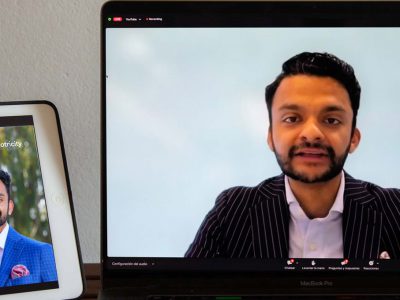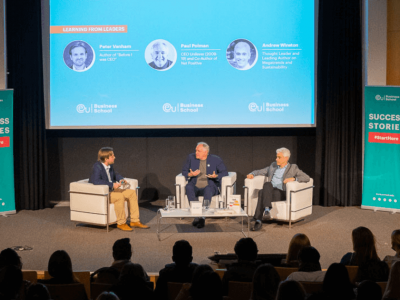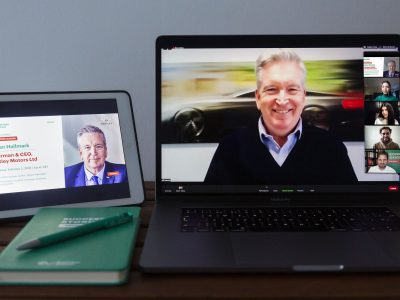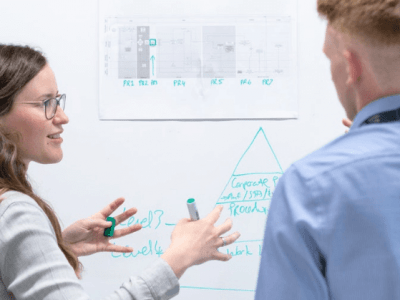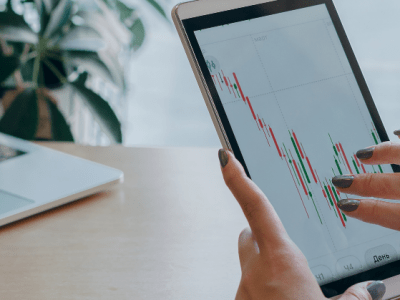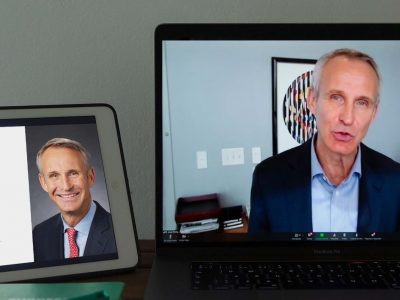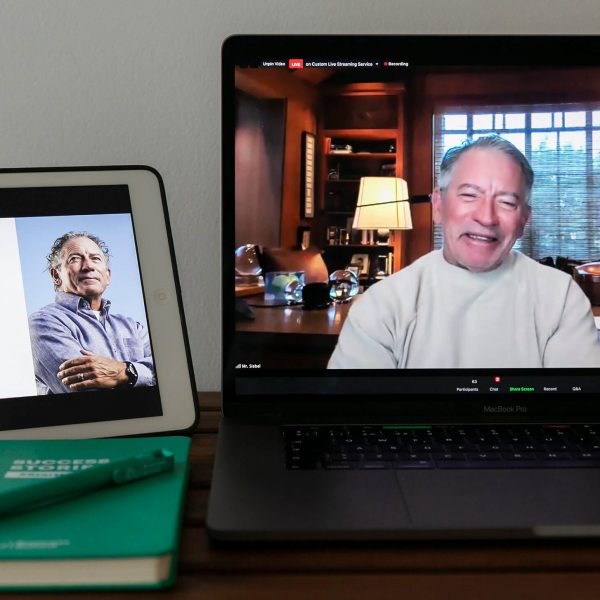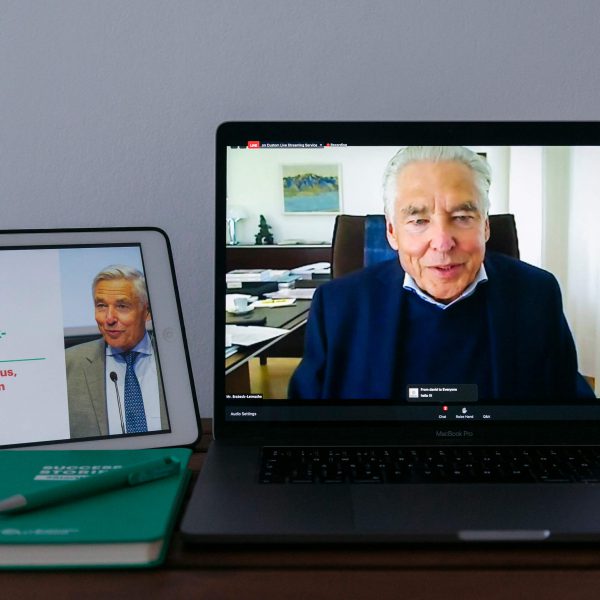Insights From Helena Hedblom, President & CEO of Epiroc AB
More and more women are now leading large, multinational companies. In mining however, it remains unusual. It was therefore a particularly great pleasure to host Helena Hedblom, President & CEO of Epiroc, at the latest of our exclusive Learning From Leaders conferences. Epiroc is a leading productivity partner for the mining, infrastructure and natural resources industries, with sales in 150 countries around the world. Leading an organization of that size takes courage and conviction, not to mention business skill. At EU Business School we believe equality in business is fundamental, and have been ranked among the best schools for female student experience.
Peter Vanham, author of “Before I Was CEO”, asked Helena about her career, her success as a female leader in a male-dominated industry and about navigating the current business climate in a deep dive interview. The interactive event, held virtually, saw EU students participate from their homes around the world and contribute questions to an insightful and far-reaching conversation.
In this blog, we’ve extracted some of the highlights from Peter and Helena’s conversation. You can enjoy the full event here.
Facing the Challenges of the COVID-19 Crisis
The mining industry moves continually through a cyclical pattern of highs and lows. Although as Helena clarified, “when it comes to equipment it’s cyclical, the actual production is stable”, which gives Epiroc the stability it needs to manage low periods.
Having worked in a cyclical industry for decades, Helena has experience of leading a company through good and bad times. She’s confident that the company will survive the coming economic downturn, even though the change we’re currently experiencing is faster than anything she’s seen before; “The cyclicality in mining usually takes three years to reach the bottom and then it can quickly go up. What we’ve seen now is big swings based on the health crisis so things that can take three years take two weeks.”
This condensed cycle defined the response at Epiroc. They were incredibly quick to react to the spread of the virus, putting travel bans in place and setting up crisis committees in every country in which they operate. Their priority was the health of their employees. Agility was fundamental, in order to keep up with the moving epicenter of the virus. In a company present in 150 countries, there was a lot to keep track of.
Helena had advice for leaders looking to manage the changes to business globally; “As an executive team you need to plan for different scenarios and then you just need to decide to believe in something, right or wrong, and execute according to that scenario.”
Decisiveness has become a defining characteristic of Helena’s leadership style. Moving fast and moving forward is essential; the paralysis of indecision can cripple a company like Epiroc.
Engineering Success
It was reassuring to hear that Helena’s success does not stem from early conviction about her future career. When it came time to graduate high school, Helena was still uncertain of her path and considered several diverse careers including music, teaching and dentistry, before deciding to follow her father into engineering.
“My father worked in the industry. I joined him many times at work and during dinners we had a lot of debates about the company. I really enjoyed those discussions at home, and I think that had an impact on the decision.”
Helena was accepted at the Royal Institute of Technology in Stockholm and became the first member of her family to go to college. Following graduation, she set out on a typical engineering career path. She took on a specialist product development role at Atlas Copco, where she would work for the next 20 years.
After several years Helena applied for a management position. “I wanted to make a larger impact, that was the reason I applied. Of course, I had no clue if I was going to be successful as a leader, but you need to try.” Despite resistance from her new team, Helena excelled from the start, taking a tough stance that enabled her to move forward in a male-dominated environment.
From there, Helena continued to rise through the ranks at Atlas Copco. As vice president of research and development she gained an “understanding [of] how to lead in a global context”; “You have to stay close even though you are far away”, she recalled. Managing teams in countries around the world was complex and she learnt to navigate the distance and the different processes and cultures. It was a period of great professional development.
When it became time for her to move on again, Helena explored similar positions at other large engineering firms. However, she found the challenge she was looking for in a general manager role at one of Atlas Copco’s production sites in Sweden.
“It was scarier, it was something completely outside of the comfort zone […] I think that was maybe the most important move I did […] into the operational flow where you feel the heat every hour.”
The move from the support function of research and development to operations was a significant change. Production moves fast and decisions must be made at speed, leading Helena to become results oriented. Despite the challenging move Helena continued to thrive and was promoted several times before becoming president of the division.
Two weeks into a new role at the executive level of Atlas Copco, the board of directors decided to split the company into two separate entities. For the next 12 months they worked to divide businesses that had been together for 140 years. It was, she said, a tremendous experience and she learned a huge amount. Amongst many other tasks they had to create new branding, new legal processes and transfer employees between the companies across the 150 countries in which they operated. It was a massive task, one which required trust in the process and acceptance from employees that these were exceptional circumstances. Having navigated this period of incredible change and emerged as CEO of Epiroc, Helena is unusually prepared to manage the current, volatile situation.
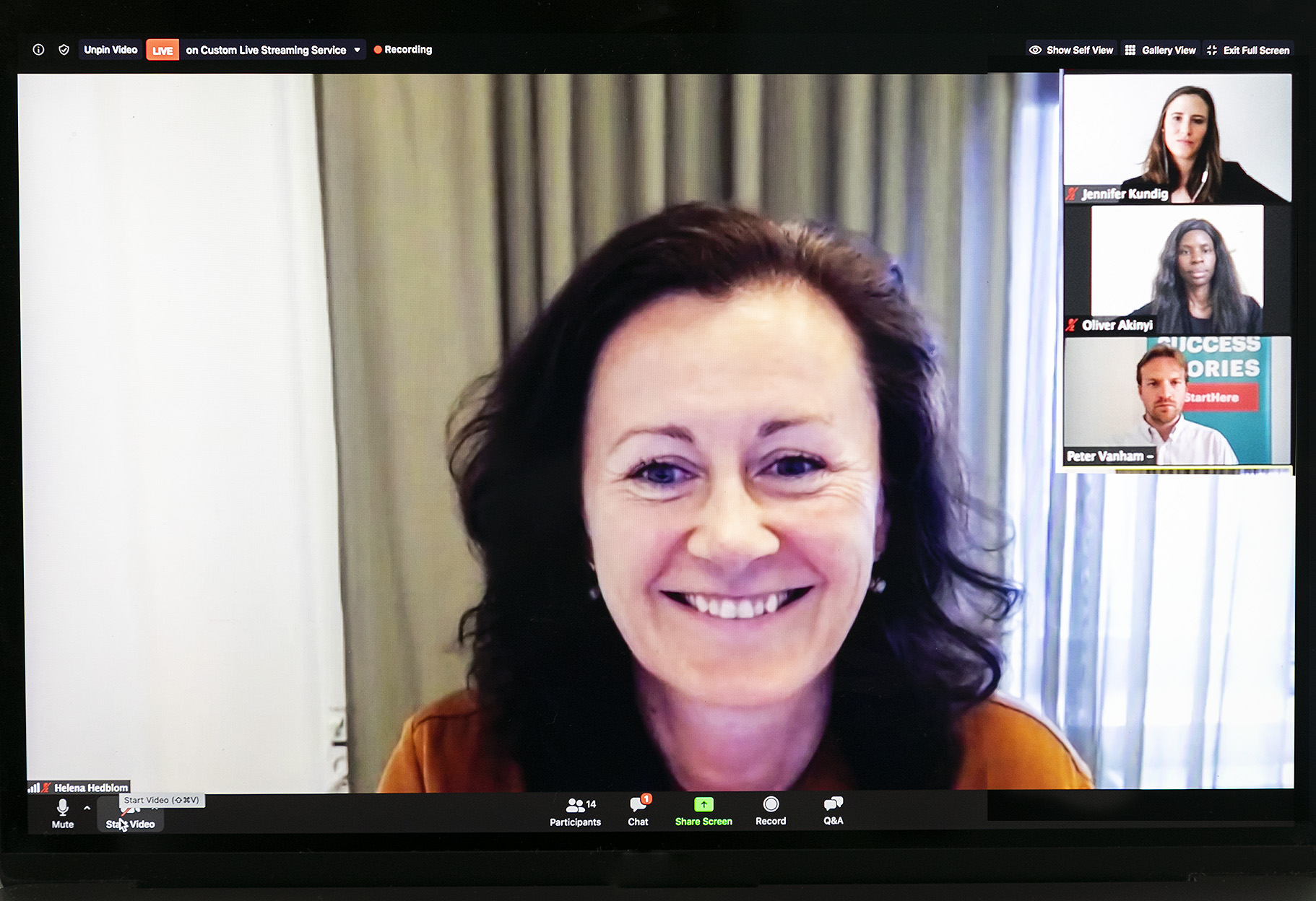

When asked by EU student Gololo what she would change about her career to date, Helena reflected; “in hindsight I would have picked my battles – I have been in a couple of battles I could have avoided if I had more experience!” but “I never planned for a next step, I’ve always been in the job and try to do my best improving things.”
It’s an attitude that several of our guests, similarly distinguished leaders, have shared, including former chairman and CEO of Tupperware Rick Goings, and Jean-Claude Biver, the charismatic chairman of Hublot and Zenith watches.
Through A Glass Ceiling You Can See the Sky
Early on in her career, Helena was faced with an employee who declared; “I don’t want to work for a woman.”
“That was the first day. At the age of 26 that was a tough one. But you need to decide who is going to be the strongest and I just decided ‘no way’. I have got this position because I am competent and I will continue.”
At the time, mining was a much more male-dominated industry. “It’s tough but you need to stay strong”, she reflected. However, now it’s a different picture; “The technology shift we’re in the middle of with automation, electrification, digitalization, I think it can attract different people today than maybe 20 or 30 years ago when mines were still dark and dangerous. Today it is high tech, we are putting 5G underground, we are running fully autonomous machines. That’s exciting stuff and I think it attracts a broader and more diverse workforce.”
When Helena started out, she was often the only woman in the room. Her strategy for thriving in that environment was to turn being different, being a woman, into an advantage.
She was particularly fascinated by mergers and acquisitions (M&A). Although not within her remit, she frequently asked to take part. “I liked the strategic challenge around M&A […] I’m a curious person, I like to learn, so I really liked that.” In M&A, having conducted the due diligence necessary before a takeover, the team would vote on whether to proceed. Driven by her commitment to herself to be honest and share her opinion, Helena was often the only person to vote no. Helena reflected: “I had different views, different angles […] my manager at that time saw that I was questioning things and that I came with a different perspective and I think that helped me to get the positions I got afterwards.”
When, inevitably, some ventures did not work as hoped, she directed conversation to reflect on the errors they’d made and asked, ‘What can we learn?’ It was not a popular approach but has informed Helena’s unflinching and honest leadership style, getting her to where she is today. And diversity and inclusion is now high on the agenda, Helena reassured the audience; “It is turning […] everyone understands the benefit of inclusion and diversity.”
EU student Oliver asked what Epiroc and the mining industry, which traditionally draws its workforce from male-dominated STEM subjects, are doing to drive forward diversity and inclusion. Helena replied, “We have set ambitions goals for 2030 to double the number of women we have in operational roles.” At Epiroc they’re looking closely at their existing workforce to find women from across the company to take on leadership positions. To support this drive, they’ve set up a mentorship program to encourage and enable women to step up. It’s not just gender diversity they’re prioritizing but diversity of all kinds; Epiroc’s management already includes employees of 33 different nationalities and diversity remains a top priority.
What Makes a Leader
Throughout her career Helena has been values-driven. Finding employees who believe in the mission of the company and bringing them on the journey with her has been central to her success as a leader.
“I spend enormous amounts of time explaining why we are doing things. That is of course the process but it’s also the way to make sure I have the team on board and that people understand and really believe in why we are doing things. Because that’s how we really make change. “
Which is why Helena encouraged EU students and guests attending to seek employers, managers and companies to work with that share their values. If you pick your leaders carefully, you’re less likely to find yourself facing discrimination or discomfort at work. Instead, you should be supported and encouraged to learn and grow.
“The company values must be the same as your own values, that’s the reason I’ve spent more than 20 years in the same company.”
Once you’ve found an organization that you believe in, raise your hand: “Show that you are prepared to take on more responsibilities, raise your hand and jump into a project on top of what you’re already doing, make yourself available and apply for positions so that the recruiting manager sees that this is someone with a strong willingness to take the next step. It is extremely important to show that confidence that you are prepared to take the next step.”
Great leaders bring others with them. “You need a diverse team […] pay attention to strong leadership capabilities and promote that”, Helena encouraged. “If you have a strong leadership you can handle anything”. Leadership and diversity should be at the top of the company agenda, Helena insisted.
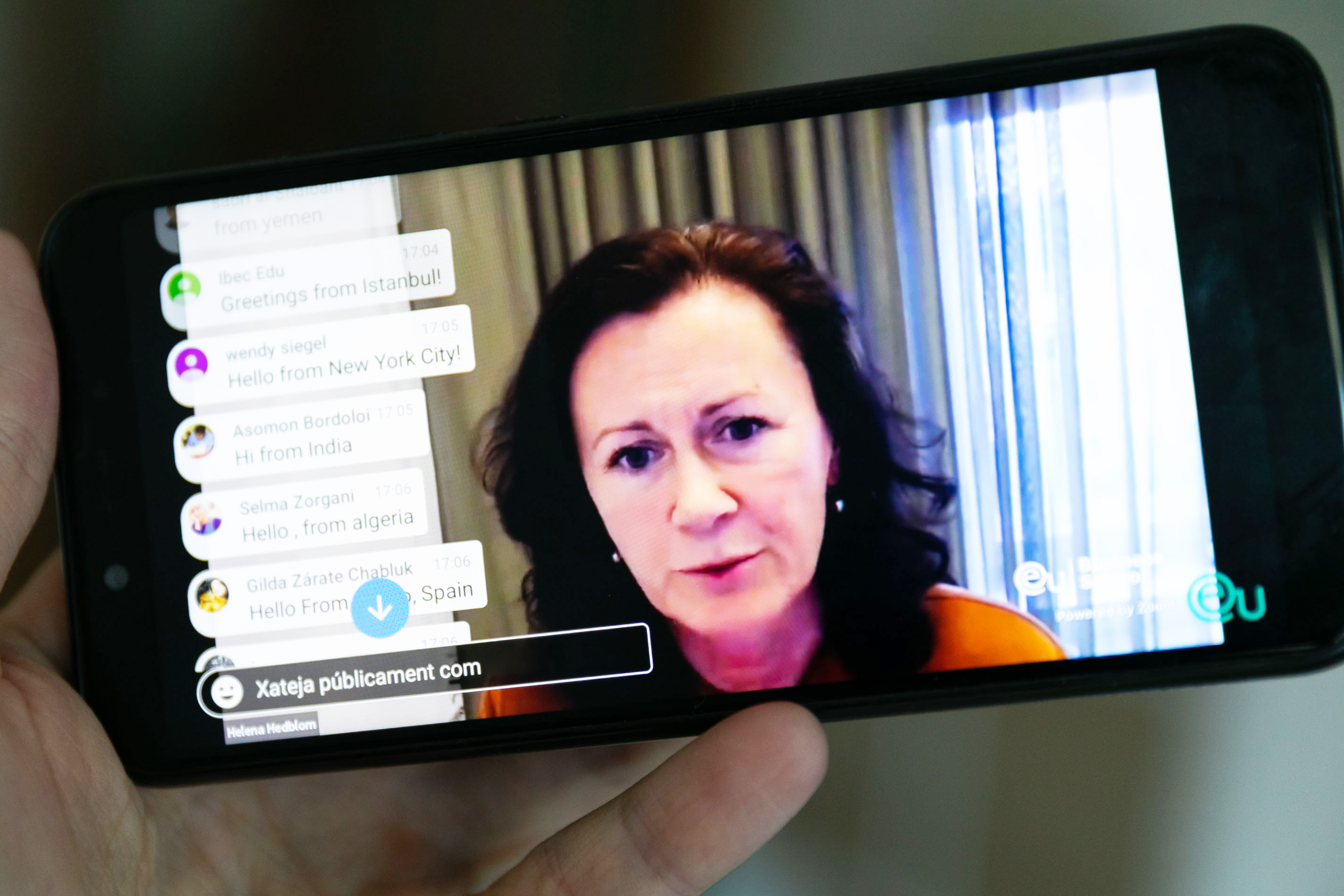

Being values-driven also informs Helena’s methodology for navigating the trickier aspects of her role as CEO. Having to close a factory is extremely painful because those employees have given their lives to the company. But however hard it is, she said, you can still do so with integrity; “You need to show respect, let people see it’s painful for you and take care of them in the best way you can”, including by offering good severance packages and helping staff to find new work.
Balance forms a core element of Helena’s leadership philosophy. EU student Diego asked Helena how she overcame her fear and gave her honest opinion, even when she was the only person saying no. Helena advised; “You need to try to overcome [fear] it’s scary […] you need to find a way to stay calm and relaxed and not take things so serious”. Balancing work with fun and prioritizing health and wellbeing have been integral to her ability to thrive, despite the stress and pressure of a global role; “Without balance it is not possible, to have a role like I have today […] you need to prioritize your own health at the same time”. “I spend most of my time doing yoga now when I am not leading the company.”
To EU students uncertain of which path to take, Helena suggested; “Pick an education where you have a lot of opportunities and where you are not too narrow in your possibilities.” You should “Pick a company that shares your values and have fun.” And if it doesn’t work out? “Dare to change, it’s not the end of the world.”
The Future of Mining
Epiroc places huge value on innovation, so Helena is not nervous about the future. Trends in play now are already informing the shape of the industry for decades to come.
Recycling has become increasingly important across all aspects of society and business. Epiroc has embraced this, producing the equipment necessary for recycling in mining. They’re proud to play an active role in transforming an industry which has historically been very damaging. They have, for example, developed a new battery-operated fleet. Innovations like these, Helena noted, help Epiroc’s clients on their own journey to greater sustainability.
And a more sustainable, eco-conscious future does not spell the end of mining. Continued growth places more pressure on extracting metals from the earth. Take, for example, the move to autonomous vehicles: “Without more copper mines, we can’t move away from diesel engines”. Which will mean more copper mines and a greater demand for Epiroc’s products.
In our inter-connected world, change does not spell disaster. Anticipating and planning for change will enable companies such as Epiroc to continue to prosper.
A Business Education for Tomorrow’s Leaders
At EU Business School we offer high-ranking programs at bachelor’s, master’s and MBA level that will prepare you for success in the fluctuating current climate. A combination of learning from professionals, entrepreneurs and consultants, using case studies, undertaking business simulations and participating in insightful events with globally influential and effective business leaders, gives EU graduates the skills, mindset and network necessary to achieve their career goals.
Discover how we can reinvent tomorrow at the next event in our Learning From Leaders conference series. In conversation with Peter Vanham, author of “Before I Was CEO”, globally renowned economist Dr. R. Seetharaman will explore ‘Sustainability and Prosperity: Building a Better Tomorrow’. The deep dive will be streamed live on EU Business School’s YouTube channel on Thursday, June 11, 2020 at 10 a.m. CEST.



